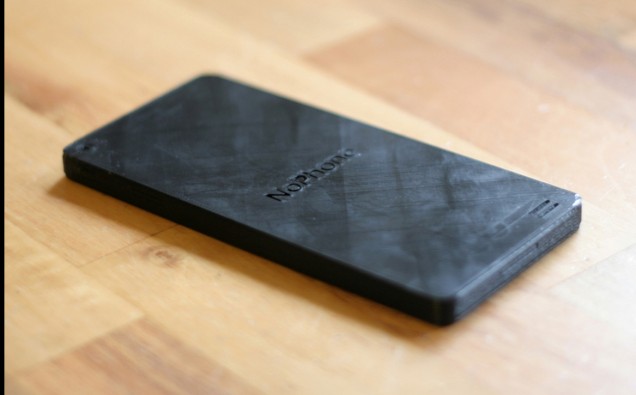- Research reveals that 6% of smartphone reliant Brits see their phone as ‘an extra limb’, with 29% unable to go more than an hour without checking it and 23% recognising they are addicted to their devices.
- 35% of Britons claim to have experienced ‘phantom vibration syndrome’ where they believe their phone is ringing or vibrating when it is not, while an additional 12% have ‘phone separation anxiety’.
- To help those who want to go break their addiction to mobile, MORE TH>N is trialling an artificial phone designed to alleviate anxiety that people can experience when separated from their real device.
- Activity has been carried out as part of MORE TH>N’s Give Your Mobile The Boot campaign, which is encouraging drivers to put their mobiles in the boot of the car before their journey so they are not tempted to use them while driving
- People wishing to pledge to give their mobile the boot can do so by using the #BootYourMobile hashtag on social media
The physical dependency that many of us experience towards our smartphone means the mere thought of going an extended amount of time without clutching it, or at least knowing it’s there in our pocket, is enough to make us feel anxious. Fortunately, a new prototype is being trialled this week that aims to ease smartphone addiction and encourage people to become less reliant on their device.
The new prototype is a ‘mobile phone surrogate’ that has been designed to replicate the exact weight and dimensions of a typical smartphone – the only difference is that it comes without ANY of the technical capabilities. No phone, no camera, no Internet – in reality, it’s just a piece of black plastic.
The concept has been developed by MORE TH>N as part of its Give Your Mobile The Boot campaign, which is attributing people’s continued usage of mobile phones behind the wheel to an ‘epidemic’ of smartphone addiction in the UK. The initiative is encouraging motorists to put their mobiles in the boot of the car before they begin their journey, so they are not tempted to use them while driving.
While the new product may not sound particularly scientific on the face of it, its development has in fact been informed by a number of recent university studies into the issue of smartphone addiction, which reveal the strong psychological and physiological effects that people can suffer from when separated from their phone1.
One of the key take-outs from this research is that people are becoming so attached to their smartphone, they would go as far as describing it as being ’like an extra limb’ – a sentiment shared by one in 20 (6%) Britons according to a study by MORE TH>N, to mark the launch of the new prototype2. An additional one in eight (12%) of those polled by MORE TH>N claimed to have ‘phone separation anxiety’ while a quarter (23%) recognised they had an addiction to their devices.
With this in mind, MORE TH>N’s aptly named ‘prosthetic phone’ will aim to provide users who are eager to ease their reliance on their real device, and limit the amount of time they spend with it, with a completely tech-free alternative that mirrors the shape and feel of a standard iPhone. It has been designed with a view to help alleviate the feelings of anxiety or insecurity that people can often experience when physically separated from their smartphone. MORE TH>N is currently looking for volunteers to trial the artificial phones and to feed back on how effective they are at easing phone separation anxiety.
The issue of just how addicted we are to our smartphones is concerning, with MORE TH>N’s research revealing that 29% admitted to be unable to go longer than an hour without checking their device before they begin to feel anxious. 31% of those surveyed also confessed that checking their phone is the first thing they do when they wake up, even before kissing or saying ‘good morning’ to a partner.
The reliance on our smartphones was further supported with over a third (35%) of people admitting to experience ‘phantom vibration syndrome’ where they imagine getting a notification, text or call but haven’t actually received one, illustrating the inherent need for new steps to be taken to help tackle the issue of mobile phone addiction in the UK. The artificial phone sets out to do just that.
To initially launch its Give Your Mobile The Boot campaign, MORE TH>N worked with psychologist and writer Amanda Hills to create a five-step tutorial for people to watch ahead of a journey3, having first placed their mobile in the boot of the car, to help overcome their Phone Separation Anxiety (PSA). The routine features a range of useful tips, including breathing exercises and stretches.
Amanda Hills commented: “The physical dependency and sense of attachment that many people have with their smartphone means our relationship with it is now far more complex than using it simply as a method of communication. With this in mind, it will certainly be interesting to see how effective the artificial phone trial is in providing people with a physical implement to potentially help condition themselves to become less reliant on their real mobile device.”
Kenny Leitch, global connected insurance director at MORE TH>N, said: “Smartphone addiction is clearly an issue that is attributing to the British public’s continued use of mobile phones when driving, in spite of the range of potential negative repercussions of doing so. That’s why we’ve created this artificial phone, which sets out to help people alleviate the anxiety that can often be experienced when we’re without our real device. While we have initially created a limited run of prototypes for self-confessed PSA sufferers to trial and feedback on, if they prove to be a hit, we are certainly eager to make them widely available so more people can feel confident that they don’t need their phone behind the wheel.”


















